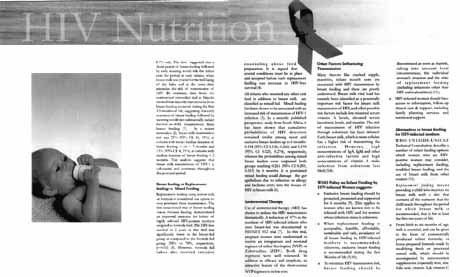The Government of India, recognizing the need to protect and promote
breastfeeding and to protect expectant and nursing mothers from adverse
influences undermining the practice of exclusive breastfeeding; has
amended the IMS act 1992 to make it more effective and eliminate all
possible loopholes in this act. The new act, ‘The Infant milk
Substitutes, Feeding Bottles and Infant Food (Regulation of Production,
Supply and Distribution) Amendment Act 2003’ was enacted on 2nd June
2003. In addition to the provision of the previous act prohibiting
promotion of infant milk substitutes and feeding bottles, the modified
act also prohibits promotion of these products on the pretext of
distribution of educational or informational material. Figure 1
shows a page from an article on ‘HIV and infant feeding’ in a quarterly
newsletter published by a prominent baby care products manufacturer. The
article has a picture of a baby bottlefeeding, although this has no
relation whatsoever with the content of the article. This thus
constitutes promotion of bottlefeeding and is in contravention to the
act.
This is one of multiple instances of promotion of
bottlefeeding, intentional or unintentional, which are seen in the media
and daily life but go unreported because of lack of active intervention
on our part, e.g., TV advertisement of a famous engine oil
manufacturer showing a car smiling after receiving the engine oil
through a feeding bottle, or the print advertisement for ‘Mrs. India
2003’ contest showing the models posing with a feeding bottle, etc. All
such violations of the act should be reported to the Breastfeeding
Promotion Network of India (BPNI).
Devendra Mishra,
Assistant Professor (Pediatrics),
Chacha Nehru Bal Chikitsalaya,
under MAMC,
Delhi 110 031,
India.
 |
|
Fig. 1. Picture of a baby bottle feeding,
accompanying an article on ‘HIV and infant feeding’. |
